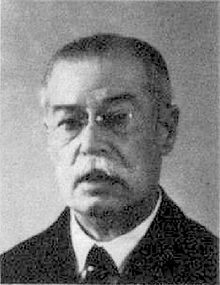|
Heinrich Claß Heinrich Claß (February 29, 1868 – April 16, 1953) was a German right-wing politician, a Pan-Germanist, an anti-Semite and a "rabid racialist".[1] He presided the Pan-German League from 1908 to 1939. Early lifeClaß was born in Alzey. His father was a notary.[2] He studied law at the Humboldt University of Berlin, University of Freiburg and the University of Giessen up to 1891, when he became a legal trainee. In 1894, he settled in Mainz as a lawyer. Political advocacy and involvementIn 1894, Claß was a founding member of the nationalist German Association, which propagated "pure Germanism" by excluding ethnic minorities.[2] In 1897, he became a member of the Pan-German League, where he was elected to the directorate in 1901. After becoming the president in 1908, he began to change the direction of the League to more radical positions. He came into sharp conflict with Theobald von Bethmann Hollweg, especially during the Agadir Crisis in 1911, and the League showed its radical positions. From the "hereditary hostility" to France and a "moral inferiority" of England, Claß advocated a speedy war, which was to lead the German Reich to "world power" and territorial expansion.[2] Also in 1911, he was one of the founding members of the Deutscher Wehrverein (German Army Society), which tried to push the armament of Germany. Claß is commonly known for his books about far-right policy that were written under the pseudonym Daniel Frymann or Einhart. The most famous was his 1912 book Wenn ich der Kaiser wär' (If I Were the Kaiser) in which he agitates for imperialism, Pan-Germanism and Anti-Semitism. During World War I, Claß called for the annexation of Belgium. In 1917, he founded the German Fatherland Party with Alfred von Tirpitz and Wolfgang Kapp. After 1918, Claß met Adolf Hitler and supported his putsch in 1923. In 1931, he was one of the founding members of the Harzburg Front. From 1933 to 1939, Claß was a member of the National Socialist Party in the Reichstag. It is noteworthy that his radical imperialism, pan-Germanism and anti-Semitism had a significant influence on the Nazis. Later lifeFrom 1943 to 1953, Claß lived with his daughter in Jena, where he died.[2] Works
References
Further reading
External links |
Portal di Ensiklopedia Dunia